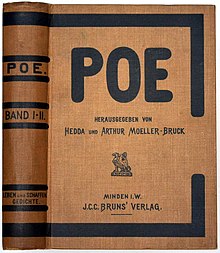Hedda Eulenberg

Hedda Eulenberg (born March 6, 1876 in Meiderich as Hedwig Maase ; † September 13, 1960 in Kaiserswerth ) was a German translator and writer.
Life

Hedda Eulenberg was born in Duisburg-Meiderich in 1876 as the daughter of the music director Wilhelm Maase. In 1893 she graduated from the Luisenschule Düsseldorf and married the writer Arthur Moeller van den Bruck in Berlin in 1897 , whom she knew from her school days in Düsseldorf. In 1901 she met the poet Herbert Eulenberg on the occasion of the premiere of his play Münchhausen in Berlin. Arthur Moeller van den Bruck fled to France in the same year for political and economic reasons.
In 1901 her ten-volume translation of the works of EA Poe was published by JCC Bruns . In 1902 the novellas Love Letters by Michel Provins and The Wife of Jeanne Marni were published by Julius Bard Verlag as translations from French . In 1903 the translation Germinal by Émile Zola was published by Reclam as the first German translation .
Hedda Eulenberg divorced Moeller van den Bruck in 1904 and married Herbert Eulenberg. In 1905 the couple moved to Kaiserswerth near Düsseldorf, where Herbert Eulenberg worked as a dramaturge at the Schauspielhaus under Louise Dumont . Until 1936 she worked in her new home as a translator of the works of Guy de Maupassant , Zola and Charles Dickens , which were published by Phillip Reclam (Leipzig) , JCC Bruns (Minden) and the Nymphenburger Verlagsanstalt (Munich). During the same period she published numerous newspaper articles, especially on monism .
In 1936 the persecution of Hedda and Herbert Eulenberg by the National Socialists began. After 1938, Hedda Eulenberg could no longer find a German publisher with whom she could have published her work. Her brother, the lawyer Friedrich Maase (1878–1959), was also persecuted, her nephew Klaus Maase (1904–2001) was imprisoned in Buchenwald , his wife Doris Maase (1911–1979) in Ravensbrück .
In 1945 the first attempts to resume the cultural activities that had been discontinued after 1936 followed. In 1952 she published her autobiography Im Doppelglück von Kunst und Leben . In 1956 she was able to continue her old work with translations by Henri Troyat , Yvette Guilbert and Thomas Burke , all at Droste Verlag in Düsseldorf . On September 13, 1960 she died in Kaiserswerth in the "Freedom House".
Works
- In the double happiness of art and life. The ferry, Düsseldorf 1952.
- Swan song. The ferry, Düsseldorf 1952.
- Women's vengeance. In: Die Zukunft (publisher Maximilian Harden ), 20th year 1912, No. 14.
Translations
- List of translations from English and French (PDF file; 32 kB)
Web links
- Literature by and about Hedda Eulenberg in the catalog of the German National Library
- Entry to Hedda Eulenberg in Kalliope
- House freedom
| personal data | |
|---|---|
| SURNAME | Eulenberg, Hedda |
| ALTERNATIVE NAMES | Maase, Hedda (maiden name); Moeller van den Bruck, Hedda (married name after first marriage) |
| BRIEF DESCRIPTION | German translator and writer |
| DATE OF BIRTH | March 6, 1876 |
| PLACE OF BIRTH | Meiderich |
| DATE OF DEATH | September 13, 1960 |
| Place of death | Kaiserswerth |
